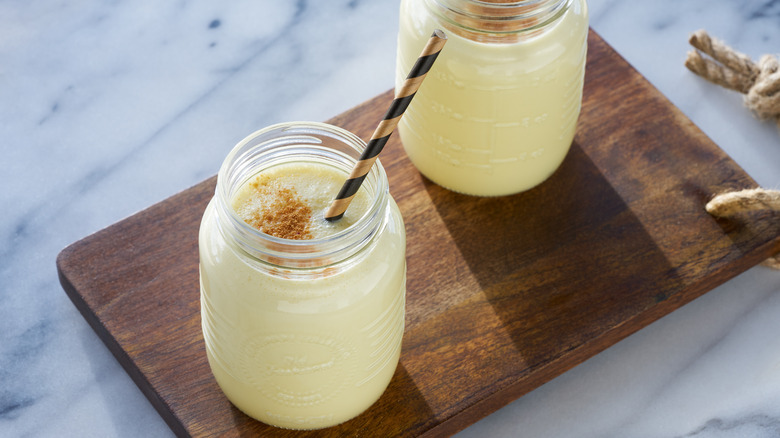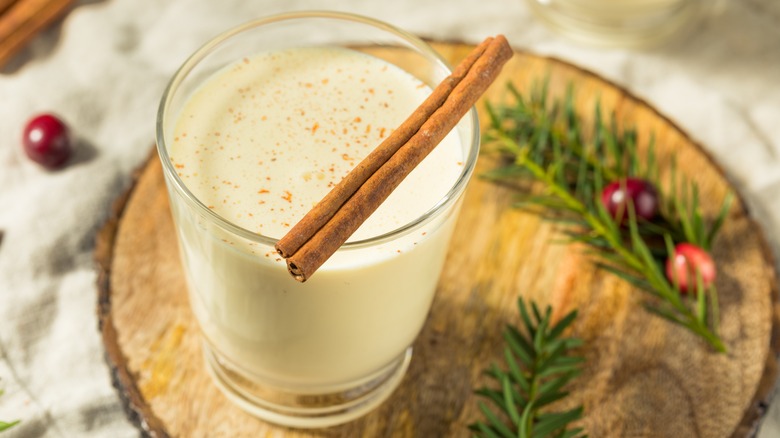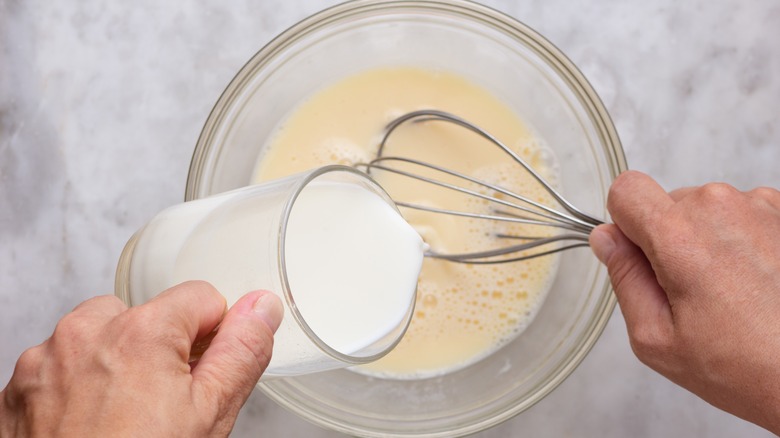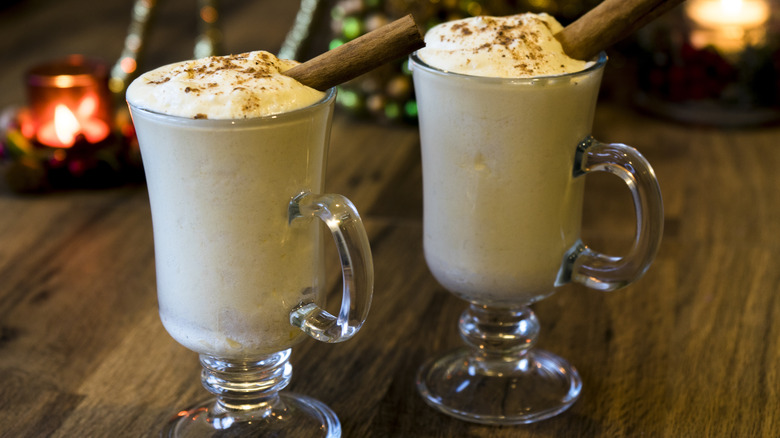Benefits Of Eggnog You Never Expected
Rich, creamy, and warmly spiced, eggnog — and especially the boozy version – has been a favorite festive libation of many people for centuries. The Smithsonian Magazine says the original eggnog, called a "posset," was a milky concoction made with alcohol, eggs, and figs by monks in 13th-century Britain.
The drink's ingredients were expensive at the time, and only the wealthy class could afford them, which is how eggnog came to be associated with prosperity and good health. American settlers brought the eggnog recipe with them in the 1700s, where cheaper rum with plentiful milk and eggs turned a fancy drink once reserved for the elite into an easily accessible beverage perfect for Yuletide toasts (per Time).
But the homemade eggnog of yesteryear is far different from the watered-down, sugar-laden, store-bought versions of today. There are seemingly endless brands and variations of eggnog available in stores throughout the country, but most include sugar or other sweeteners, from high fructose corn syrup to carrot juice.
According to Food Network, the average serving of eggnog contains around 170 calories and 8 grams of fat. While a usual beverage serving is one cup, for eggnog, it's actually only half a cup. But while it's not the healthiest drink on the planet, there may be some benefits of eggnog you never expected.
Eggnog provides vitamins and minerals
Whether heavy cream, low-fat, or non-dairy milk, the milky, eggy part of eggnog is packed with vitamins and minerals. Milk contains significant amounts of calcium, magnesium, phosphorous, and vitamins A and D (via Women's Health). Although a serving of eggnog is only half a cup, many people will drink a full cup.
In 1 cup, most dairy-based eggnogs will give you 48% of your daily value (DV) of B12, 37% of B2 (riboflavin), 25% of calcium, 22% of phosphorous, 17% of vitamin A, 15% of vitamin D, and 11% of magnesium and zinc. You'll also get smaller amounts of B6, iron, vitamins C, E, and K, potassium, thiamin, niacin, and folic acid (per Nutrifox).
By contrast, non-dairy milk-based eggnogs could have as few as 50 calories in half a cup, and you'll still get a good deal of calcium. According to SparkRecipes, if you're going with vegan nog, you could miss out on some of the above vitamins and minerals. However, depending on the ingredients, you could add manganese, copper, selenium, and pantothenic acid.
Eggnog is packed with antioxidants
Nutmeg and cinnamon are the black or brown flecks you see in eggnog. Cinnamon, nutmeg, and vanilla give eggnog its warmly spiced flavor. Hyper Biotics says vanilla and cinnamon are chock full of antioxidants. Ancient Egyptians regarded cinnamon as so rare and valuable, it was considered a gift fit for kings (per Healthline).
Extracted from the inner bark of Cinnamomum trees, the compound cinnamaldehyde gives cinnamon its pungent aroma and spicy flavor, and it also holds most of cinnamon's health benefits. Cinnamon offers antioxidants such as free radical-fighting polyphenols, according to Healthline.
While more research is needed, a 2015 study in Food & Function supported cinnamon's anti-inflammatory properties, concluding, "Cinnamon and its components may be useful in the treatment of age-related inflammatory conditions."
WebMD says nutmeg's antioxidants might help with anti-aging and may help protect against cancer, heart disease, and liver disease. And vanilla's antioxidant effects may protect cells from oxidative stress and could help prevent liver damage (per Healthline).
Animal studies suggest that vanilla's anti-inflammatory properties may protect against inflammation-induced cell damage and reduce skin inflammation from psoriasis. Put them together, and cinnamon plus vanilla may be an anti-inflammatory match made in heaven.
There's a ton of protein in eggnog
According to the United States Department of Agriculture (USDA), 1 cup of typical store-bought eggnog contains close to 12 grams of protein. The Mayo Clinic says 10-35% of your daily caloric intake should come from protein, which means 50-175 grams for a 2,000-calorie diet. On the lower end, that's nearly 25% of your daily protein needs from just 1 cup of eggnog.
Protein helps the body repair old cells and generate new ones. Protein is especially critical for growing children and teens, and for proper fetal development and cellular protection in pregnant women (via MedlinePlus). Just serve the non-alcoholic kind to these groups, be careful with sugar levels, avoid undercooked or raw eggs, and keep eggnog away from children under the age of 1 (per Romper).
The body needs 20 different amino acids. Digestion breaks down protein-rich foods into essential amino acids. Eggnog's base is milk and eggs, and both are abundant sources of amino acids. They contain a full amino acid profile, including high amounts of leucine, a key amino acid involved in insulin signaling, energy metabolism, and protein synthesis (per SFGate).
How to make eggnog healthier
If you want to make your holiday toast healthier, here are a few ways to kick up the benefits of eggnog without sacrificing much flavor or fun. Making your own eggnog at home could be even more fun than cracking open a carton. You'll find a huge variety of recipes for everyone online, no matter what your dietary needs or flavor preferences are.
Monk fruit can be used in place of sugar, according to Women's Health. Plenty of non-dairy versions of eggnog are readily available in most locales if you don't do dairy. If you want a vegan option, use coconut milk for a thick and creamy vegan version perfect for making a Coquito, the coconut-y Puerto Rican version of eggnog (via African Bites).
To pack an extra protein punch, make homemade eggnog and add a vanilla protein shake to the usual ingredients to add a whopping 30 grams more protein per 11-ounce container (per Premier Protein). But not all protein shakes are created equal. If you use one, the Mayo Clinic recommends you look for one with 200 or fewer calories, no trans-fat or partially hydrogenated oils, less than 5 grams of sugar, and fewer than 2 grams of saturated fat.
Leave out the alcohol to reduce calories, make it kid-friendly, and remove any negative impacts alcohol might have. Avoid serving eggnog made with raw eggs to children, pregnant people, or people with weakened immune systems, warns Women's Health. Using pasteurized eggs can reduce the risk of salmonella.





